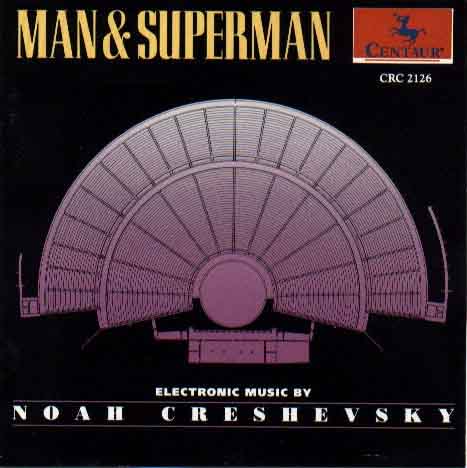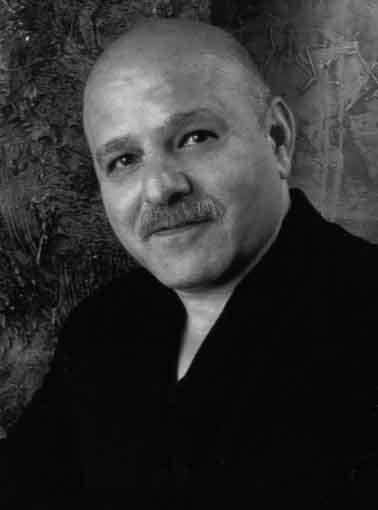|
Noah Creshevsky began musical study at
the Eastman School of Music. He
graduated from the State University of
New York at Buffalo, where he was a
pupil of VirgilThomson, arid studied with
Nadia Boulanger in Paris and
Fontainebleau. His master’s degree is
from the JulWard School, where he was a
pupil of Luciano Berio.
Creshevsky’s work has been supported by
grants and awards from the National
Endowment for the Arts, the New York
State Council on the Arts, and ASCAP.
It has been published by Alexander
Broude, released on recordings, and
performed and broadcast in the United
States, Europe and Asia.
A professor of music at Brooklyn College
of the City University of New York,
Creshevsky has served on the faculties of
the Juilliard School and Hunter College
and as a visiting professor at Princeton
University.
Creshevsky has been composing electronic
music for more than twenty years. Many
of his works explore the boundaries of real
and imaginary ensembles though the
fusion of opposites: music and noise,
comprehensible and incomprehensible
vocal sources, human and superhuman
instrumental skIlls.
His latest music integrates electronic and
acoustic sources to create superperformers
— hypothetical virtuosos who transcend
the limitations of individual performance
capabilities.
The result is electronic music of
symphonic proportion in which expansive
gesture and a vast sonic palette are
combined to form expressive ties between
the real and unreal, man and superman.
|
|
|
|
| Variations (1987) | 16:35 |
| Variations
1987
“It is in looking for possibilities that
you find reality. . . . This year I
received a letter which went thus:
‘Mademoiselle, the cow is better, my
wife is dead, the trees are shooting up.
My respects.’ Well, that’s a very real
letter.” — Nadia Boulanger
The digital sampler and the computer
have made possible an unprecedented
degree of technical accuracy and
efficiency, and have made available
the sounds of all things and the music
of all times.
flexibility.
I chose in Variations to spend time
with the ancient and parsimonious
notion of economy by restricting my
choices to pitched sounds only. Even
so, a great many timbres are
introduced and united.
The principle of perpetual variation
operates throughout; sectional
repetitions are interrelated solely
through a few prominent motivic and
rhythmic elements.
Yeta kind of puritanical restraint and
frugality persist. I am skeptical of the
view that economy should be
considered the proper mission of all
human endeavor, and celebrate
abundance — both in the expanded
palette of musical sounds and
technologies, and in the existence of
more and better choices and enhanced |
| |
| Electric String Quartet (1988) | 6:05 |
| Electronic String Quartet
1988
“We bake a cake and it turns out tha
the sugar was not sugar but salt. I n
sooner start to work than th
telephone rings.”
— John Cage, “Juilliard Lecture”
One plays the way one can
One plays the way one can’t
One talks,
One does other things. |
| |
| Memento Mori (1989) | 11:10 |
| Memento Mon
1989
“The boundaries which divide Lif
from Death are at best shadowy an
vague. Who shall say where the on
ends, and where the other begins?”
— Edgar Allan Poe, “The Prematur
Burial”
The fusion in Memento Mon o
radically contrasting material
represents the ever-present awarenes of the human condition, a recognition of our collective identity, and the inevitableility of our common destinations - made every day more movingly evident.
|
| |
| Electric Partita (1990) | 7:54 |
| Electric Partita
1990
“A performance so complete, so wholly
integrated, so prepared, is rarely to be
encountered. Most artists, by the time
they have worked out that much
detail, are heartily sick of any piece
and either walk through it half asleep
or ham it up.”
— Virgil Thomson,
reviewing Wanda Landowska’s
performance of Bach’s Goldberg
Variations, February 22, 1942.
Electric Partita was composed for an
ensemble of improbably accomplished
performers, capable neither of fatigue
nor histrionics, that exists and can
only exist on tape.
Digital dexterity reaches unlikely
levels through the union of the human
hand and the digital computer.
A technical feature of the 14th-
I century isorhythmic motet is the
application of a reiterated pattern of
time values to present a liturgical
cantus firmus.
Of particular appeal are motets in
which the number of notes in the
melody — color — and rhythmic
pattern — talea — do not coincide.
This produces a complex internal order
which is anything but obvious to the
ear.
A concealed interior structure existing
in the realm of abstraction and
I contemplation rather than as
something capable of being detected
by hearing would have pleased the
medieval musician. |
| |
| Talea (1991) | 8:15 |
Talea
1991
A technical feature of the 14th-
century isorhythmic motet is the
application of a reiterated pattern of
time values to present a liturgical
cantus firmus.
Of particular appeal are motets in
which the number of notes in the
melody — color — and rhythmic
pattern — talea — do not coincide.
This produces a complex internal order
which is anything but obvious to the
ear.
A concealed interior structure existing
in the realm of abstraction and
contemplation rather than as
something capable of being detected
by hearing would have pleased the
medieval musician. |
| |
|
|



